Inside the Mind of Your Child: the Phenomenon of Imaginary Friends
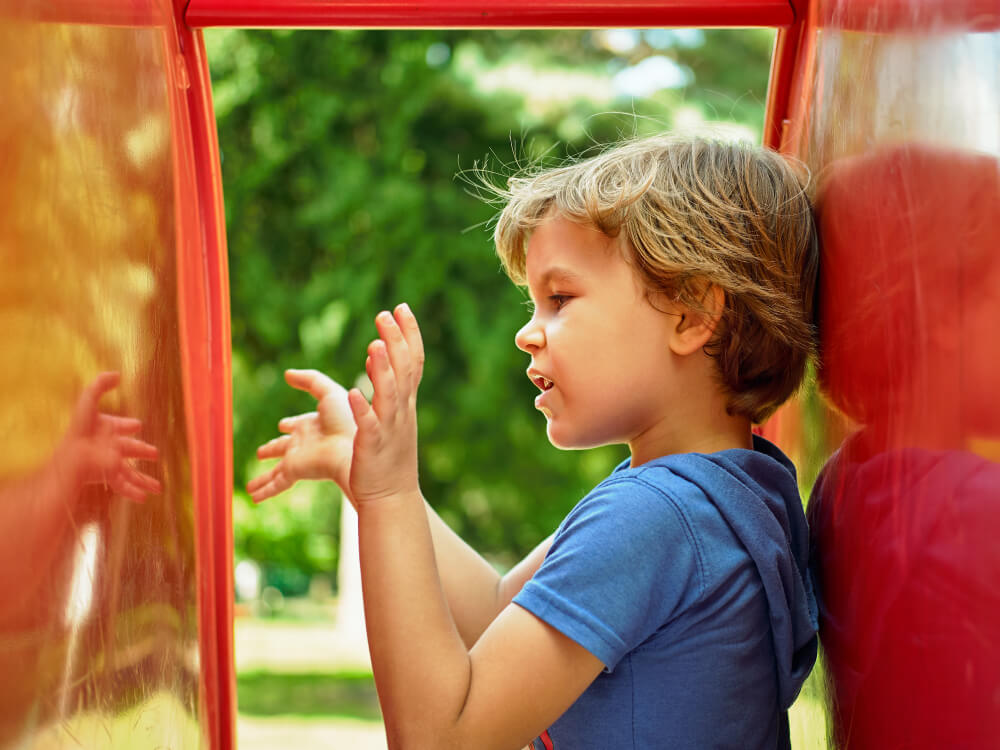
Plenty of people have heard the term “imaginary friend,” but might not have any firsthand experience of the concept until their kids start talking about a friend who isn’t really there. It can be confusing and even worrying when your children have imaginary friends, but there’s often no need to worry too much.
This guide will cover all you need to know about imaginary friends, including why they appear and when you may need to be concerned.
Contents:
- What Are Imaginary Friends?
- When Do Imaginary Friends Appear at Different Stages?
- What Age Do Kids Grow Out of It?
- Why Do Children Have Imaginary Friends? Purposes and Causes
- Is it OK for Kids to Have an Imaginary Friend?
- How Should a Parent React?
- When Imaginary Friends Cause Problems
- FAQs
What Are Imaginary Friends?
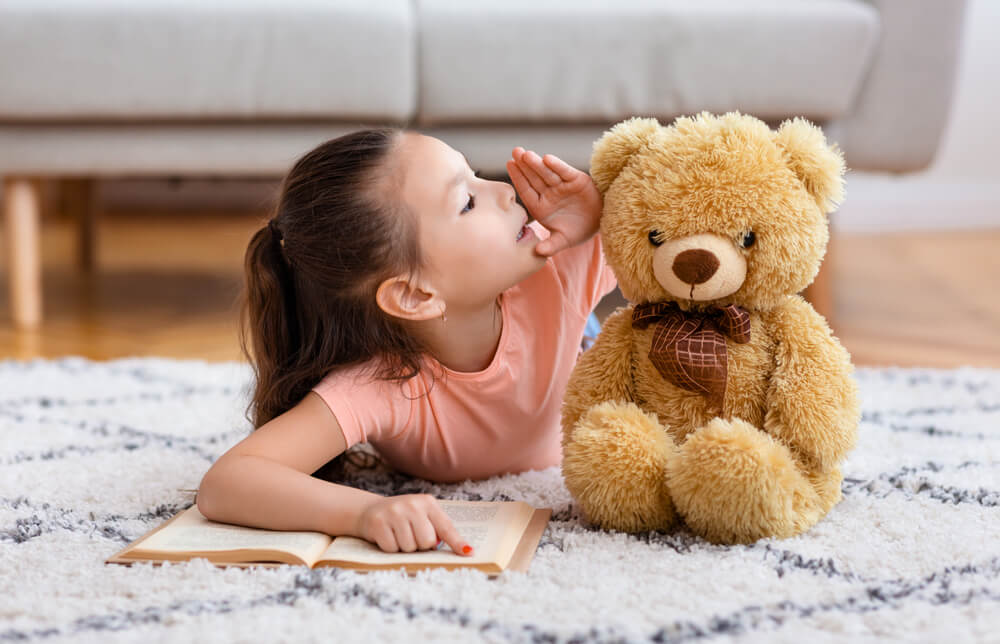
Prostock-studio/Shutterstock.com
First, a definition. The term “imaginary friends” can be a little confusing, and there are several different ideas and interpretations about the concept. So let’s dig into what it actually means with a generally accepted definition.
In simple terms, an imaginary friend is just what it sounds like—a friend who isn’t there. You can also call them “pretend friends,” “made-up friends,” or “invisible friends.”
These “friends” come in all shapes and forms. They might be based on someone your child actually knows or used to know, or they could be a total figment of their imagination with no basis in reality whatsoever.
They might also be permanent, with your child talking about them all the time and acting as though they’re always present, or ephemeral, meaning that they come and go almost at random or according to some sort of pattern or schedule.
The idea of imaginary friends is a global one, and there have been recorded cases of kids with imaginary friends all over the world throughout history. Different cultures see them in different lights, with some even believing that “imaginary friends” are ancestors or relatives who passed on.
When Do Imaginary Friends Appear at Different Stages?
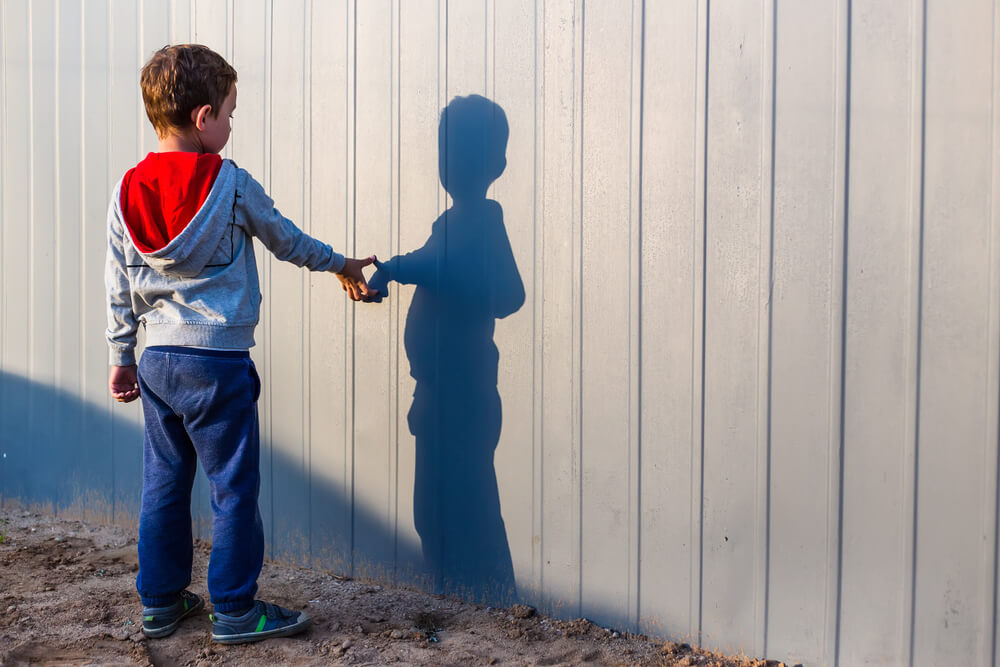
EvgeniiAnd/Shutterstock.com
Imaginary friends can appear throughout a child’s life. They may go years without one and then suddenly have one, or they might start off with an imaginary friend quite early in their lives and then grow out of it.
In general, the earliest you may expect to encounter an imaginary friend is with a toddler of around 2-3 years old. Kids of 4, 5, and older may also have imaginary friends as well, and these friends can stick around for weeks, months, or even years.
What Age Do Kids Grow Out of It?
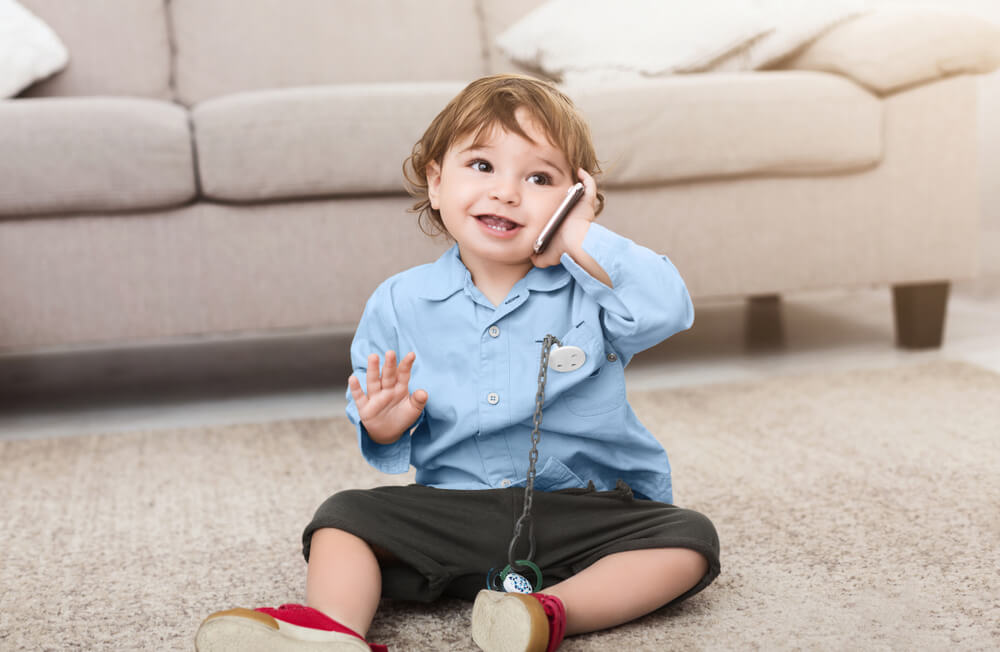
Prostock-studio/Shutterstock.com
There’s no single answer to “How long do imaginary friends last?” as it can really vary from case to case and child to child. Some will be quite brief and kids get bored of them or grow out of them in a matter of days or weeks, but others can persist for years of their lives.
In most cases, kids will stop talking about imaginary friends and grow out of them by the age of around 8 or 9. It’s quite rare for kids any older than this to have an imaginary friend, but it’s not unheard of. Even young teens may have an imaginary friend in some cases.
Understanding imaginary friends is an essential part of childhood development, but ensuring your child’s safety is paramount. With the Findmykids app, you can monitor your child’s whereabouts and ensure they’re always in safe hands, whether they’re playing with real or imaginary friends. Download the app today and give yourself peace of mind while nurturing your child’s imagination!
Why Do Children Have Imaginary Friends? Purposes and Causes

Yuganov Konstantin/Shutterstock.com
The “Why?” of imaginary friends is one of the biggest questions of all. Parents often want to know why their kids feel the need to invent a made-up or invisible friend and worry that it’s a sign or symptom of some sort of trauma or something lacking in their lives.
In reality, there are quite a few possible explanations for why these friends appear.
A Sign of Loneliness
One of the most common explanations for imaginary friends is that they fill some sort of gap or void in the child’s life. They might lack real-life friends and companionship or feel quite lonely, so create a friend to keep them company. This is why a lot of imaginary friends appear when kids start elementary school, as they’re having to adjust to new situations and spend less time at home with their parents.
Read also A Kid’s Guide on How to Make Friends at School (Plus Tips for Parents!)
A Sign of Intelligence
There’s also one hypothesis that suggests kids with imaginary friends are more likely to be creative and have high IQs. The creation of an imaginary friend can therefore be seen in a very positive light, as it shows a good imagination and ability to visualize things that aren’t physically there.
A Sign of Self-Awareness

Vilshanskyi/Shutterstock.com
There’s another theory among child experts that states that imaginary friends exist as kids become more self-aware and egocentric. As kids get older and get more understanding of themselves and the world around them, having an imaginary friend can be a good way to express the new emotions and feelings they’re experiencing. Plus, they get control over what their invisible friend says and does, which can be quite self-affirming.
Some other reasons include:
- Response to Changes or Disruptions. Some children create imaginary friends in response to changes or disruptions in their environment. Events such as moving to a new home, the birth of a sibling, or other transitions may prompt children to create imaginary companions as a way to cope with these changes.
- Inspiration from Media and Literature. Imaginary friends can be inspired by characters from books, movies, television shows, or even real-life experiences. Children may create imaginary friends based on characters they admire or find fascinating, incorporating them into their play and daily activities.
- Support and Comfort. Imaginary friends offer companionship and comfort to children, providing a sense of security and support during times of stress. They serve as a constant presence, offering listening ears and unconditional acceptance, which can be especially reassuring in new or unfamiliar situations.
Is it OK for Kids to Have an Imaginary Friend?

De Visu/Shutterstock.com
Absolutely. It’s normal and natural for parents to worry a little when their kids start talking to a friend who isn’t there, but it’s also normal and natural for kids to have these imaginary friends. Lots of kids have them.
In fact, studies have shown that around 3 in 10 kids aged 5 and above have an imaginary friend at some stage, which shows just how common they are. In the majority of those cases, there’s no need at all for parents to worry, and the children eventually grow out of their made-up friends.
Investigations show that children with imaginary friends aren’t at any higher risk of major problems, and the idea that these friends are a sign of mental health issues or trauma has mostly been discredited and disproven.
How Should a Parent React?
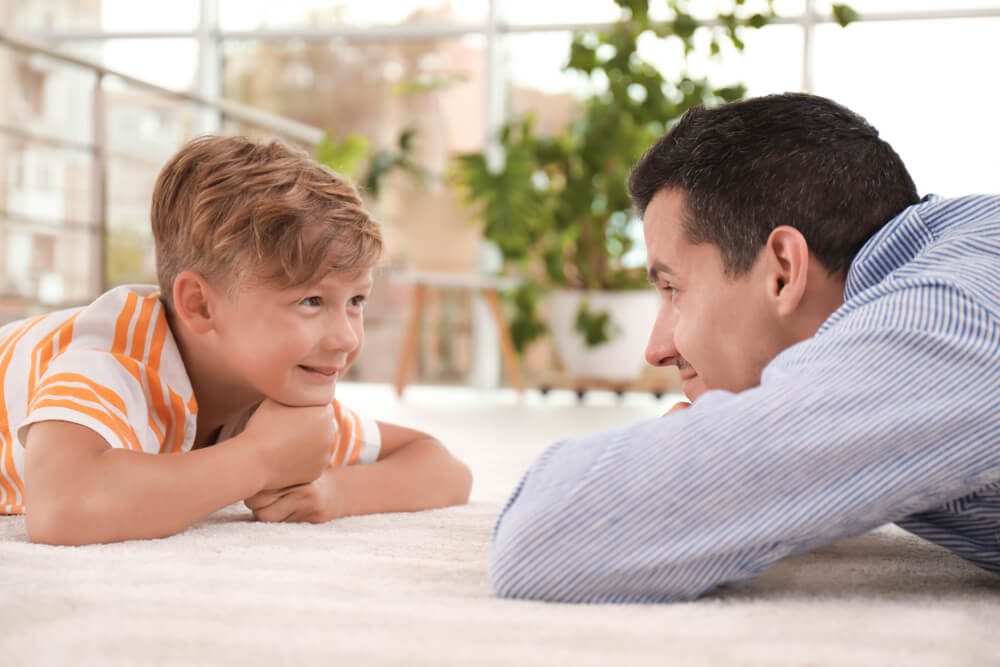
New Africa/Shutterstock.com
First, stay calm. As stated, there’s almost never any reason to worry or panic when your child has an imaginary friend. It’s a natural and normal part of many children’s development and imaginative growth.
Instead of responding with fear or worry, parents should be inquisitive. Ask questions of the child to learn more about their imaginary friend, like their interests, appearance, and so on. This may help you learn more about your own child’s desires and likes or dislikes in the process.
Respect your child’s imagination and validate their feelings towards their imaginary friend. Avoid dismissing or belittling their experiences, as this could discourage open communication.
Also try to find out what the child is getting from the relationship with their imaginary friend. Maybe the friend helps them express themselves or cope with change, for example, which can also teach you about your child’s emotional state and needs.
Establish clear boundaries regarding where and when it’s appropriate to engage with their imaginary friend. For example, it’s fine during playtime but not during mealtime or bedtime.
It also helps to play along in certain ways, like asking how the friend is doing or even setting a place for them at the dinner table. However, if the friend seems to become a source of bad behavior in your child, you’ll need to set boundaries and discipline accordingly.
Anyway, try to encourage your child to engage in real-life interactions and activities with peers. While imaginary friends can provide comfort and companionship, it’s essential for children to develop social skills and friendships with their pee
When Imaginary Friends Cause Problems
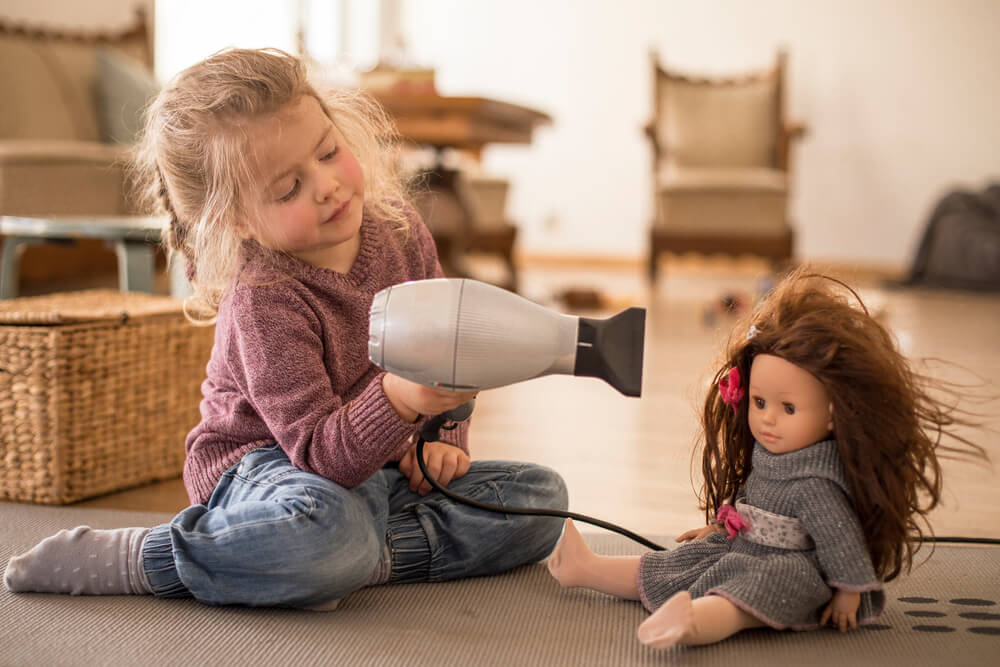
Laura Appena/Shutterstock.com
More often than not, an imaginary friend shouldn’t cause any trouble. But there are cases where kids may behave badly and then “blame” the friend or say that their friend is encouraging them to do bad things.
In that case, parents may need to take appropriate action.
What if the Imaginary Friend Is Scary?
If the child’s imaginary friend seems disruptive, aggressive, or even frightening to you or your child, that may be a sign of a deeper problem that needs addressing. Communicating with your child to understand their needs and feelings is key to helping you figure out why they would create such a friend, and you may also want to consult professionals, like a child psychologist.
When to Worry?
You may need to worry about imaginary friends if they’re triggering bad behavior in your child or making them more secretive and cut-off from real-world relationships and connections. It can also be troubling when children blame their imaginary friends for things they do or say, or if they suffer sudden mood swings related to the friend.
Summing Up: The Truth About Imaginary Friends

fizkes/Shutterstock.com
As this guide shows, most of the time, kids with imaginary friends are no cause for concern. In fact, it can even be a good sign when a child has a friend like this, as it may show intelligence, creativity, and a gifted mind. However, there are rare cases when it’s something to worry about, and parents should remain observant and aware of their children to understand their emotional state at all times.
Imaginary friends is a psychological phenomenon that many children typically develop as part of their growing imaginations. While it may sometimes cause extreme anxiety for parents, it’s important to recognize that these friendships play a role in the social and safe exploration of interpersonal skills.
Imaginary friends often emerge as children navigate group dynamics and learn about communication through animal, fantastical, or even inanimate toy characters. These interactions and engagement with imaginary companions can enhance a child’s activities and provide a sense of comfort and companionship.
Instead of trying to get rid of imaginary friends, parents can support their child’s imaginative play while also ensuring they have real-life companions to interact with.
FAQs

Rafinaded/Shutterstock.com
What are imaginary friends a symptom of?
They’re not necessarily a symptom of anything and can be a perfectly normal part of childhood development and play. However, some experts suggest that a pretend friend can be a sign of loneliness or trauma response.
Is it normal to have imaginary friends?
Absolutely. Lots of children have these friends and grow out of them naturally over time.
What triggers imaginary friends?
Most of the time, an imaginary friend is just a natural way for a child to play and express themselves, but they may also be triggered by lifestyle changes, like starting school or moving somewhere new.
Are imaginary friends a trauma response?
Sometimes, but not always. Some children may respond to a traumatic situation by creating a new friend that they can talk to about how they’re feeling.
The picture on the front page: Evgeny Pylayev/Shutterstock.com
Проверьте электронный ящик



















